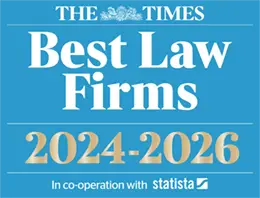Freezing Injunctions
Freezing injunctions (also known as Mareva injunctions) are court orders used to stop someone from moving or disposing of assets. They’re commonly used where there’s concern a defendant may try to avoid a judgment by hiding or transferring assets. These orders can be made urgently, often without notifying the respondent.
A freezing injunction is an essential tool for anyone looking to protect assets to ensure those assets are available and not put beyond the reach of a creditor.
These Court Orders are very serious and require immediate action. It is vital to take early control and deal with the requirements of the order.
If you find yourself in this situation, you need to act quickly. Whether you’ve been served with this type of Court Order of you are about to sue a person or a company and you feel that they may take this evasive action.
BTMK has significant experience in handling disputes and matters such as these and which involve complying with or obtaining Court Orders at very short notice.
If you’ve been served with a Freezing Order, ensure you contact us at the first possible opportunity as a failure to comply with the terms of such a Court Order can bring severe penalties.
Our phone lines are available 24/7 for these types of matters. Call us on 03300 585 222.
BTMK Solicitors, has also been recognised as a top 250 law firm in The Times’ Best Law Firms Report 2025, for their high-quality legal services.
It’s the second year in a row and the report specifically references BTMK’s litigation & dispute resolution team which specialises in commercial and contract disputes, inheritance, wills and probate disputes, insolvency & employment law, as well as personal injury and clinical negligence work.
When and Why Freezing Orders Are Used
Freezing injunctions are usually sought before litigation begins or during proceedings, particularly where asset dissipation is suspected. They’re essential for:
- Preserving assets enforceable by judgment or arbitration awards
- Supporting foreign court proceedings or international arbitration enforcement
New Procedural Rules
In 2025, England and Wales implemented a new Part 25 of the Civil Procedure Rules, streamlining the rules into six sections: interim remedies in general, interim injunctions, freezing injunctions, search and imaging orders, interim payment orders, and security for costs.
Three model court orders were introduced, including one specifically for proprietary and freezing injunctions. These now embed updated case law notes and remind applicants of the duty of full and frank disclosure.
If you have a solid, legitimate legal claim and reliable evidence that the defendant may move or hide assets, in particular identified funds or property, a freezing injunction can be your best move. It stops assets leaving an applicant’s reach so that any eventual judgment remains enforceable.
Similarly, if you can show a strong prima facie case and real risk that evidence could be destroyed, you can apply for a search order. This allows a legal team (under court supervision) to enter premises and secure documents or material that might otherwise be lost.
You can seek such an order even against individuals or companies not yet formally part of the proceedings.
At BTMK, we guide you through every step, from identifying the right assets to demonstrating the risk of dissipation or destruction. With BTMK your application will be submitted under the correct rules with full and frank disclosure.
The Legal Tests for Freezing Injunctions
The Court of Appeal confirmed that applicants only need to show a “serious issue to be tried”. What was required as a “good arguable case” is now at the lower threshold of not requiring a better-than‑50% chance of success.
What Courts Consider
Evidence must show a real risk of asset dissipation. Suspicion alone is not enough. Courts will rely on evidence such as complex financial structures, dishonesty, or refusal to disclose assets, and may draw negative inferences from non-compliance.
How They Work
Applications typically include a witness statement and are often made without notice to prevent asset concealment.
At BTMK we understand just how crucial timing is and know that applications should be made promptly after a risk is discovered.
The order restrains asset movement up to a specified maximum, while allowing routine trading and necessary payments like living expenses and legal fees.
What Can Be Frozen
A freezing order can include:
- Bank accounts
- Property
- Investments
- Vehicles and other tangible assets
- Business income, if operated in the ordinary course of business
They do not freeze assets such as perishable items or assets beyond the applicant’s reach. Importantly, assets held by a third party under the control of the respondent may fall within the order, even without direct ownership.
Injunction Variants
- Maximum sum orders; these are the most common variant
- Specific asset orders; these target particular high-value property
- General orders; these cover all assets, but are rare and only available in exceptional circumstances
Worldwide freezing orders require evidence of overseas assets under jurisdiction and a genuine risk of dissipation.
Related Court Orders
Requests often include additional orders in support of the injunction. For example:
- Disclosure orders to compel asset details
- Passport orders in serious fraud cases
- Imaging or search orders to seize records or digital data
- Receivership, bank disclosure or delivery-up orders
Strategic Considerations
When you’re applying for a freezing injunction, it’s essential to act with urgency under Part 25 of the Civil Procedure Rules.
At BTMK we make sure your application closely follows the model orders and is backed by clear, forward-looking evidence showing a legitimate and demonstrable risk of asset dissipation. These preparations are critical to convincing the court of the need for protection.
If you’re responding to a freezing injunction, we’ll scrutinise the applicant’s evidence for any weaknesses or misrepresentations. As experienced specialists we can emphasise where the risk of dissipation is speculative rather than real. Where evidence is flawed or insufficient, we can potentially persuade the court to vary or discharge the order.
The court will also require you to give a cross-undertaking. This is essentially a promise to compensate the respondent if the order turns out to have been wrongly granted. This may also include financial security or a bank guarantee, potentially amounting to substantial sums.
Need Expert Guidance?
For urgent freezing injunction applications or responses, expert guidance is essential. Call the specialists at BTMK straight away.
BTMK has a wealth of experience acting on behalf of businesses and individuals in obtaining, opposing and dealing with freezing and other types of urgent injunctions. If you need expert assistance with obtaining or responding to a freezing order, contact us.
An example of our work in this area is here https://www.btmksolicitors.co.uk/news-updates/missing-millions-and-the-vanishing-lawyer/

















